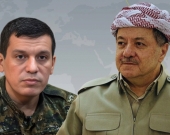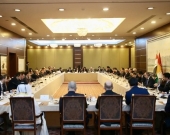Iraqi Christian Leaders Appeal for Cross-Faith Unity

LONDON –Two Christian leaders appealed for unity within and across the different faiths and ethnicities of Iraq at an event celebrating the Christians of Kurdistan in London last week.
“We don’t have a stable government in Baghdad and it doesn’t treat us well,” said Saadi Al Malih, director of Syriac culture and art at the culture ministry of the autonomous Kurdistan Regional Government (KRG).
“But sometimes we have our inside problems and we are not fighting together,” he told Rudaw.
Malih and Father Najeeb Michaeel, a Dominican priest who works and teaches in Mosul, both spoke at the Royal Geographical Society about the history of Iraq’s Christian community as well as the current challenges and dangers they face.
Father Najeeb helped to found the Digital Centre of Eastern Manuscripts in Mosul in 1990 that has digitized and preserved some 6,000 manuscripts and parchment documents, including a New Testament dated 942 A.D.
“We don’t need money for eating and drinking but support for intellectual freedom,” he told Rudaw.
“We do not want to divide Iraq into small units and we do not want to separate peoples or different tribes and religions because we all have the same history or shared history in Iraq, which goes back to thousands of years,” he said in his speech.
Before the two men spoke, there was a performance by Rayia Mato, a deaconess of the Syrian Orthodox Church, who has sung at many events in England and abroad and who studied at the University of Mosul.
An exhibition of photographs of Kurdistan in the 1940s, by Anthony Kersting, was on display along with archive images from the Dominican community of Erbil, the Kurdish capital.
Benam Al-Agzeer, a deacon in the Syriac Catholic church who was granted asylum in Britain in 2003, was present with examples of his calligraphy, in which he depicts verses from the Koran and Bible.
There was also a mini fashion show of costumes from the Museum of Syriac Heritage in Ankawa, a Christian district of Erbil.
Both speakers stressed that they wanted to play an inclusive role in the future of Kurdistan, where Christians make up 5 per cent of the estimated five million population.
“I would like to emphasize that Christians in Iraq do not want only to live in Kurdistan just because they are persecuted everywhere else, or just to live in peace and comfort,” said Father Najeeb, whose first language was neo-Syriac. “But also they want to contribute to the development and construction of this region of Iraq.”
Malih pointed to the success of the teaching of the Syriac language as one of the major achievements of his department.
After being questioned in detail by a member of the audience who said he wished for similar developments in teaching in his native Italy, Malih explained how they started teaching the language in Kurdish schools starting with the first grade and progressing year-by-year to reach all 11 classes.
“There was a lot of enthusiasm because it was something new and for a long time under Saddam Hussein there was very little Syriac teaching. We’ve built something we never had since the fall of Babylon in 538 BC,” he said. “We have 10,000 students. There is a boom in our language that we never had in Iraq.”
He praised the fact that Kurdish Christian MPs were guaranteed representation in the KRG parliament under a quota system. “Some are active, some are not so active,” he said, lamenting the splintering of the political process. “We have 13 political parties for this small nation.”
Father Najeeb recalled that when he was studying in France, he was asked when he “converted” to Christianity. He replied by saying 2,000 years ago. Christianity was one of the main religions of Mesopotamia until the Arab Muslim conquests of the mid- to late 7th century.
“Over the centuries, Christians in the Middle East translated the most important books in philosophy, theology, astronomy and logic from Greek and Assyrian into Arabic,” he said. “Through them, these sciences arrived in Spain in the Middle Ages and then to Europe.”
Both speakers denied that the persecution of Iraqi Christians approached that of Armenians, who suffered what most scholars call a genocide under the Ottomans in 1915.
“Saddam Hussein killed dozens of people but not like the massacres of 1915. Now, when Iraqis are being killed in Baghdad, people start to remember the millions killed in Turkey,” said Malih.
“People are defending themselves and are now closer to the church. I remember when Ainkawa had only one church full of old people. Now, there are seven or eight churches full of young people,” he said.
Asked about views held by extreme Muslims who believe converts who leave Islam should be killed. Father Najeeb denied that Christians were seeking converts.
“Our mission is to help everyone. We don’t want all Kurdistan to be Christian, because we respect each other,” he said. “We prefer to be Christians than to be terrorists and kill people.”
RUDAW












